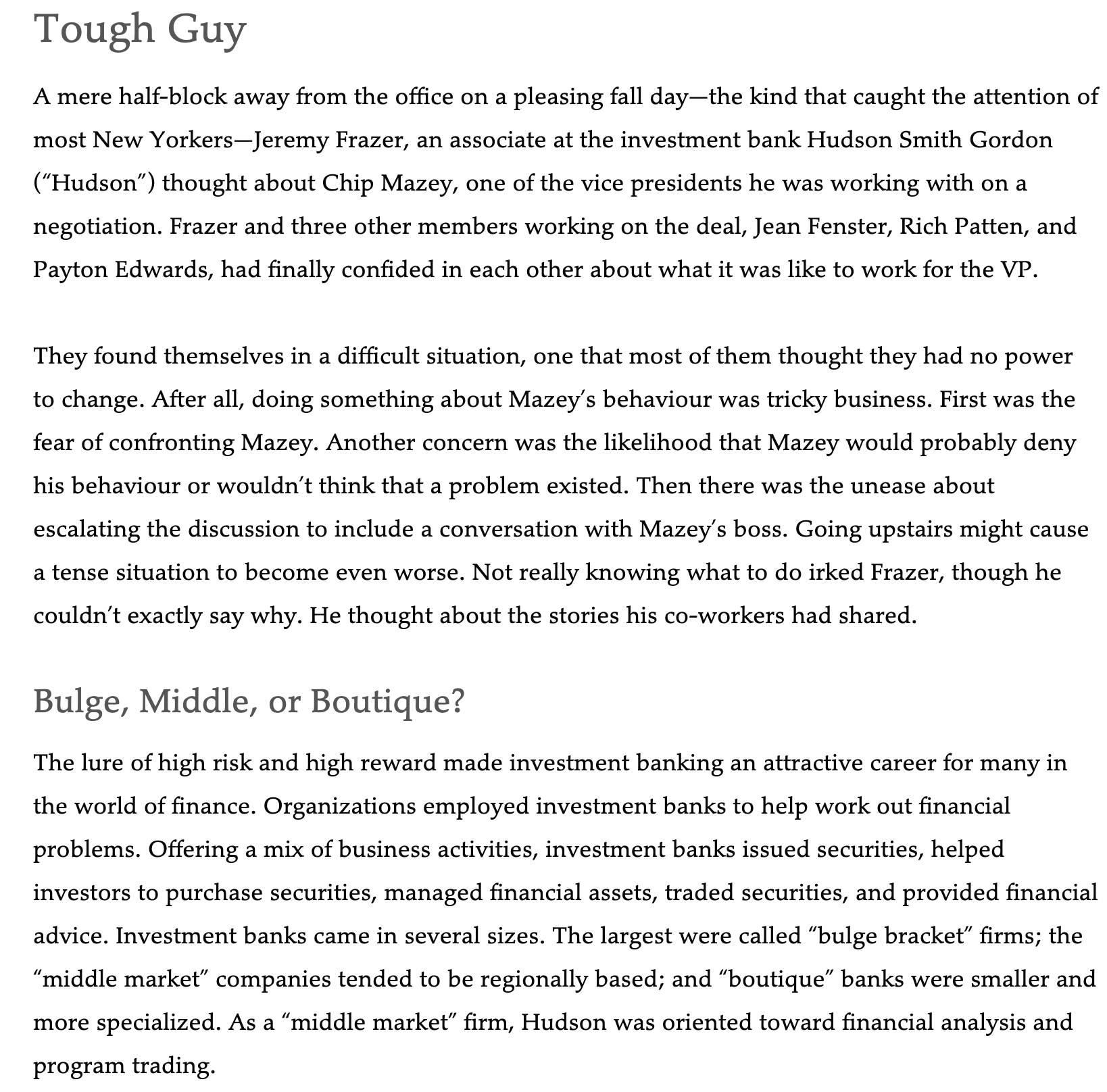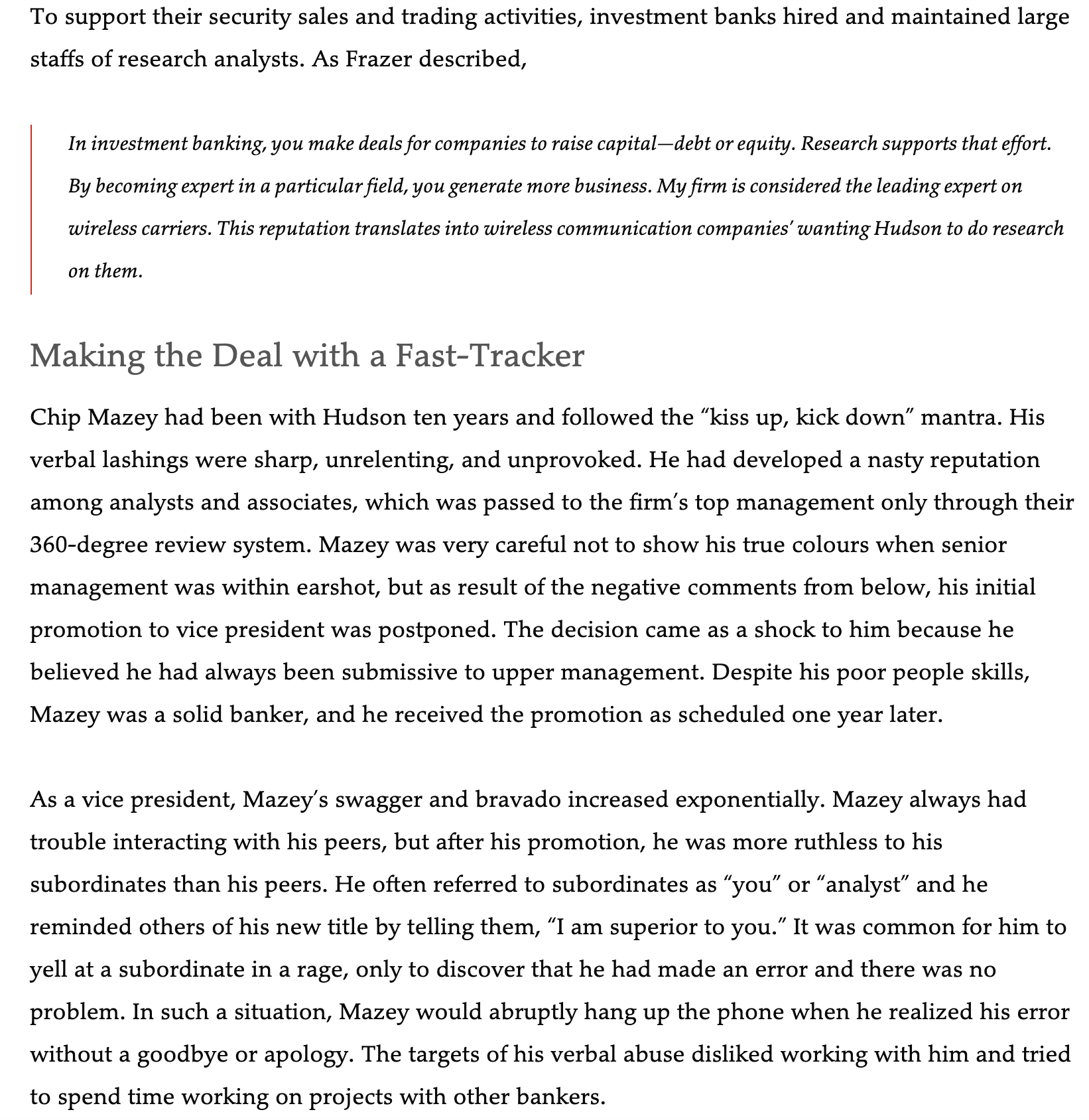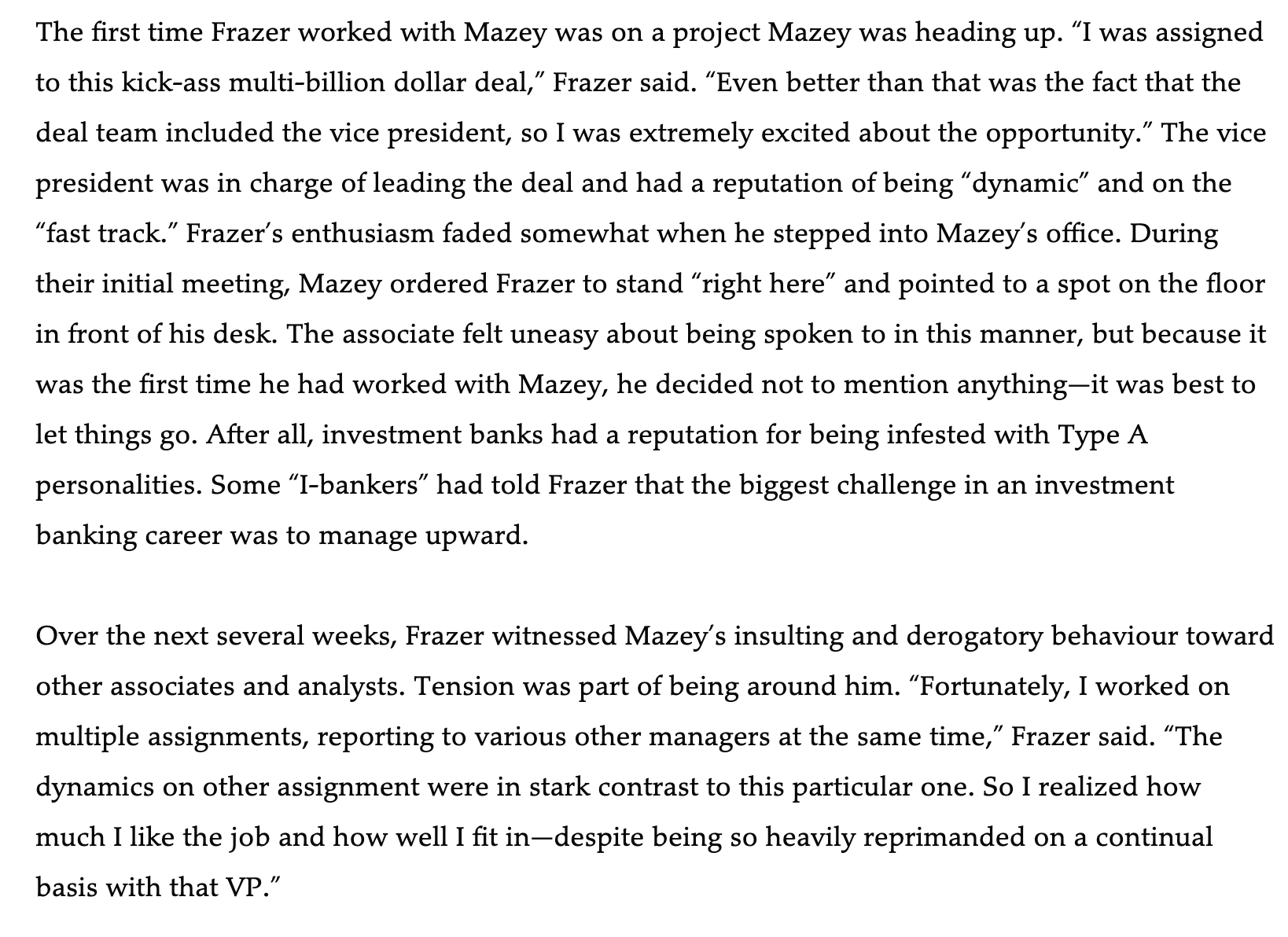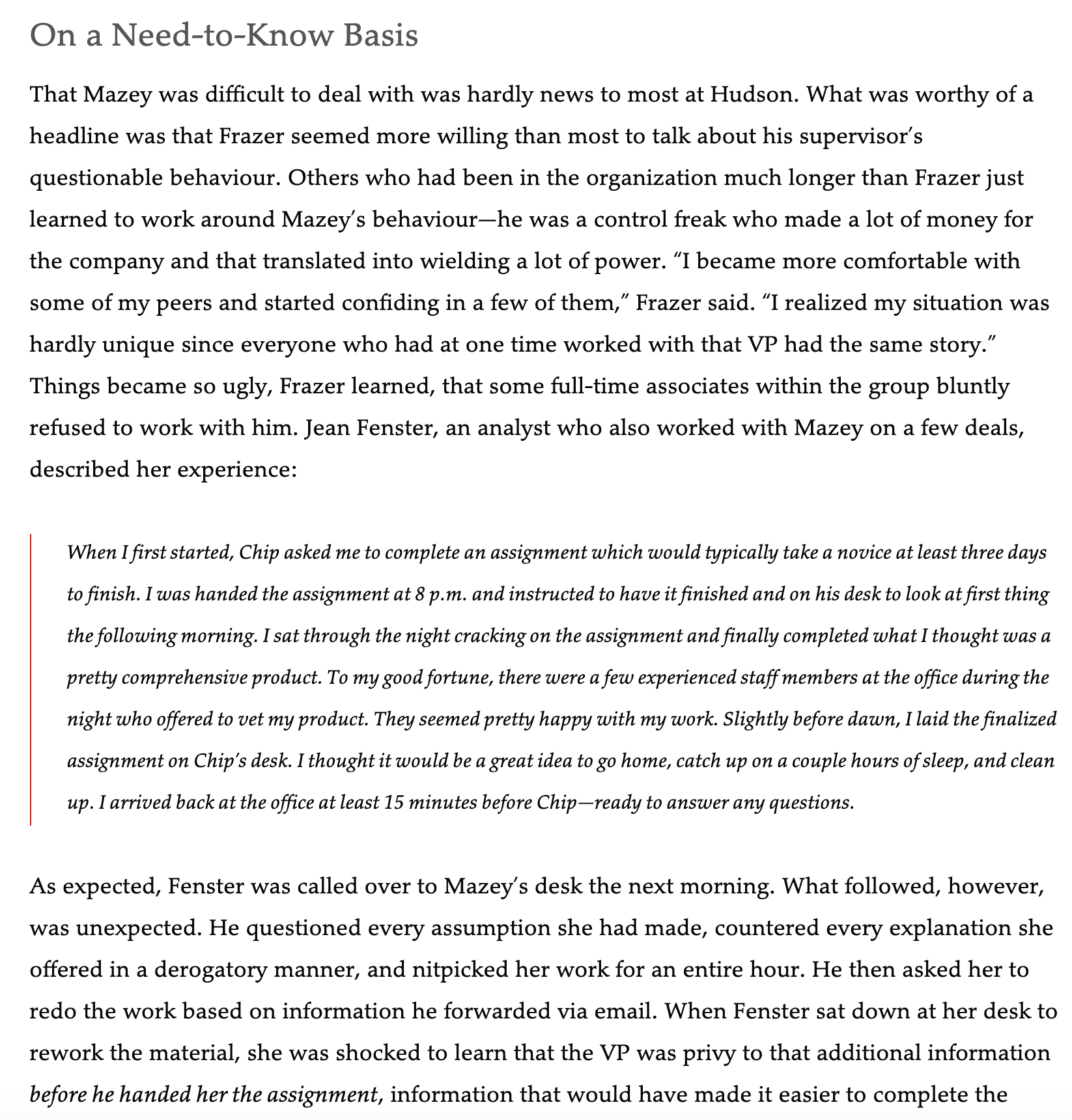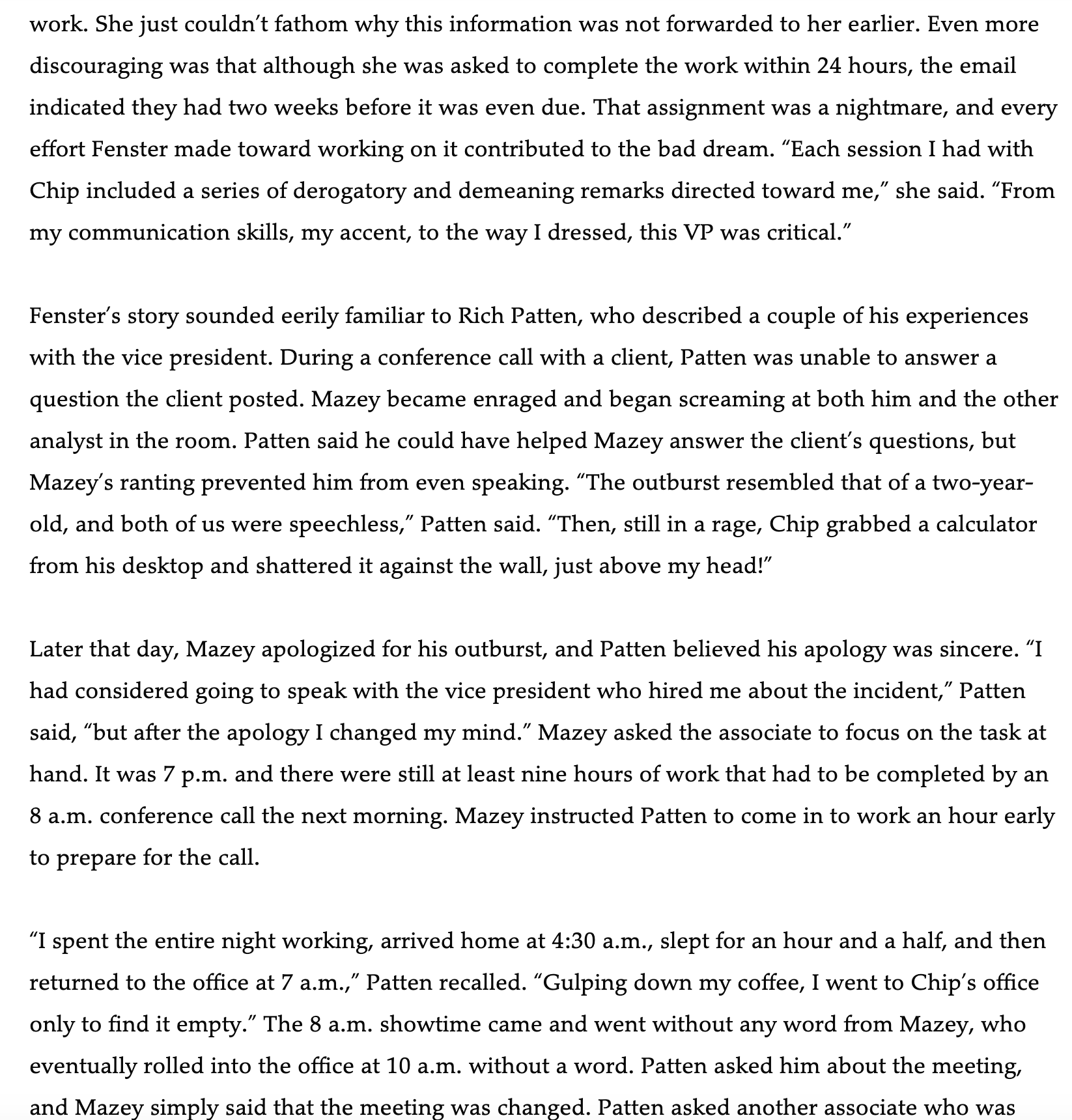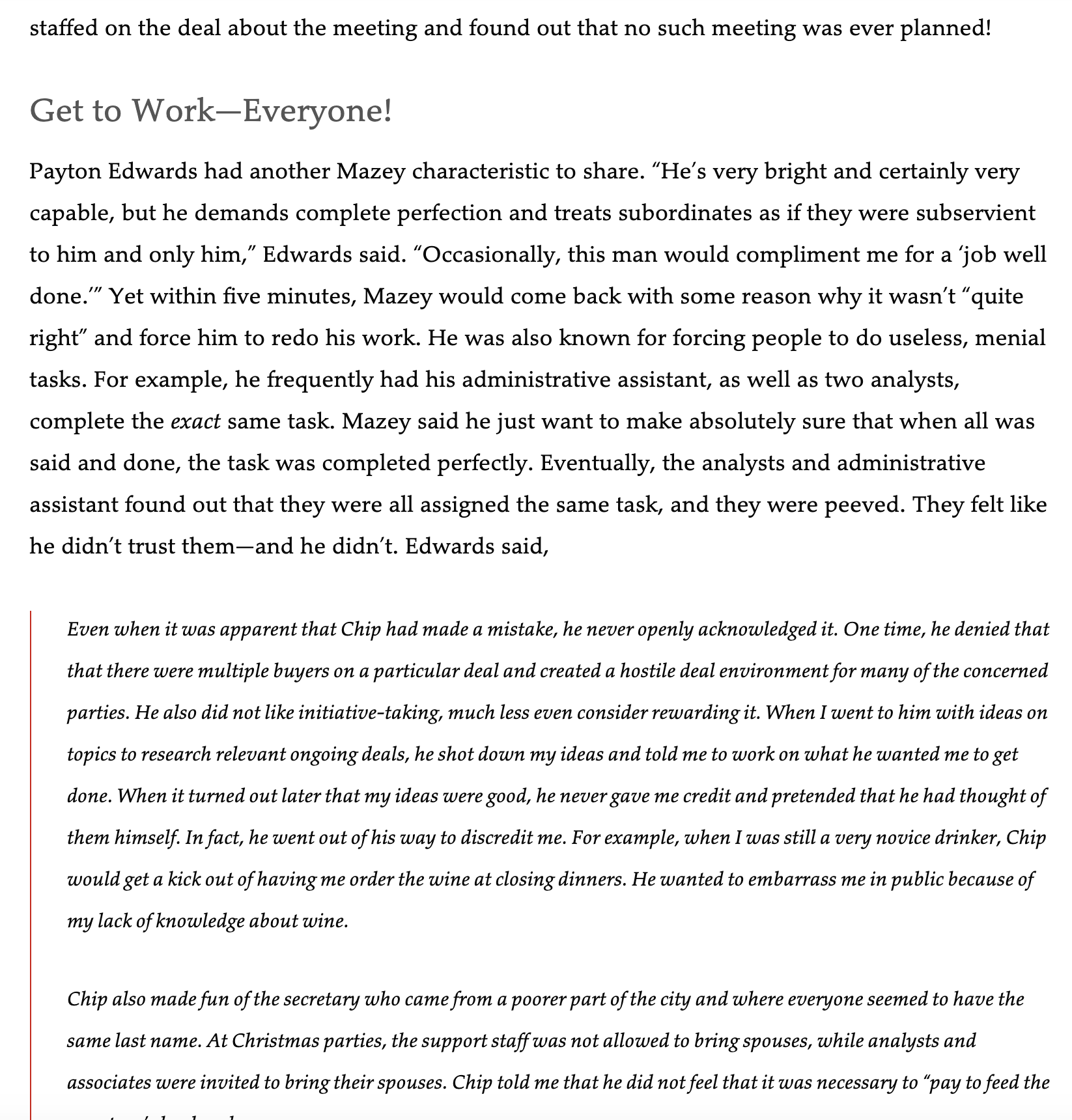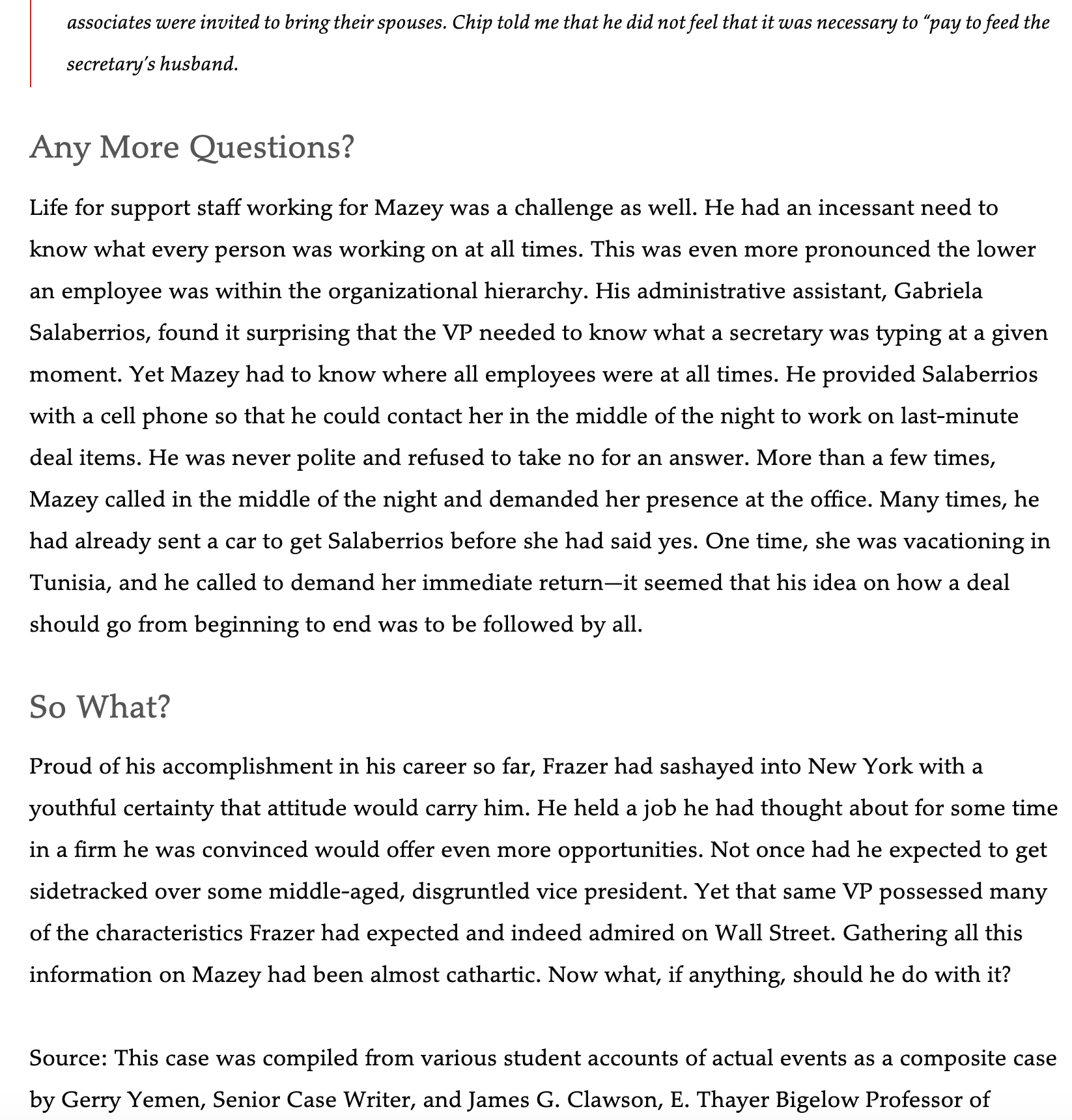Would you explain the last question? THANK YOU VERY MUCH!
Tough Guy A mere half-block away from the ofce on a pleasing fall daythe kind that caught the attention of most New YorkersJeremy Frazer, an associate at the investment bank Hudson Smith Gordon (\"Hudson\") thought about Chip Mazey, one of the vice presidents he was working with on a negotiation. Frazer and three other members working on the deal, Jean Fenster, Rich Patten, and Payton Edwards, had nally conded in each other about what it was like to work for the VP. They found themselves in a difcult situation, one that most of them thought they had no power to change. After all, doing something about Mazey's behaviour was tricky business. First was the fear of confronting Mazey. Another concern was the likelihood that Mazey would probably deny his behaviour or wouldn't think that a problem existed. Then there was the unease about escalating the discussion to include a conversation with Mazey's boss. Going upstairs might cause a tense situation to become even worse. Not really knowing what to do irked Frazer, though he couldn't exactly say why. He thought about the stories his coworkers had shared. Bulge, Middle, or Boutique? The lure of high risk and high reward made investment banking an attractive career for many in the world of nance. Organizations employed investment banks to help work out nancial problems. Offering a mix of business activities, investment banks issued securities, helped investors to purchase securities, managed nancial assets, traded securities, and provided financial advice. Investment banks came in several sizes. The largest were called "bulge bracket\" rms; the "middle market" companies tended to be regionally based; and \"boutique\" banks were smaller and more specialized. As a \"middle market\" rm, Hudson was oriented toward nancial analysis and program trading. To support their security sales and trading activities, investment banks hired and maintained large staffs of research analysts. As Frazer described, In investment banking, you make deals for companies to raise capitaldebt or equity. Research supports that effort. By becoming expert in a particular eld, you generate more business. My firm is considered the leading expert on wireless carriers. This reputation translates into wireless communication companies' wanting Hudson to do research on them. Making the Deal with a Fast-Tracker Chip Mazey had been with Hudson ten years and followed the \"kiss up, kick down\" mantra. His verbal lashings were sharp, unrelenting, and unprovoked. He had developed a nasty reputation among analysts and associates, which was passed to the rm's top management only through their 360-degree review system. Mazey was very careful not to show his true colours when senior management was within earshot, but as result of the negative comments from below, his initial promotion to vice president was postponed. The decision came as a shock to him because he believed he had always been submissive to upper management. Despite his poor people skills, Mazey was a solid banker, and he received the promotion as scheduled one year later. As a vice president, Mazey's swagger and bravado increased exponentially. Mazey always had trouble interacting with his peers, but after his promotion, he was more ruthless to his subordinates than his peers. He often referred to subordinates as \"you" or \"analyst\" and he reminded others of his new title by telling them, \"I am superior to you.\" It was common for him to yell at a subordinate in a rage, only to discover that he had made an error and there was no problem. In such a situation, Mazey would abruptly hang up the phone when he realized his error without a goodbye or apology. The targets of his verbal abuse disliked working with him and tried to spend time working on projects with other bankers. The rst time Frazer worked with Mazey was on a project Mazey was heading up. \"I was assigned to this kick-ass multi-billion dollar deal,\" Frazer said. "Even better than that was the fact that the deal team included the vice president, so I was extremely excited about the opportunity." The vice president was in charge of leading the deal and had a reputation of being "dynamic\" and on the "fast track.\" Frazer's enthusiasm faded somewhat when he stepped into Mazey's ofce. During their initial meeting, Mazey ordered Frazer to stand "right here" and pointed to a spot on the oor in front of his desk. The associate felt uneasy about being spoken to in this manner, but because it was the rst time he had worked with Mazey, he decided not to mention anythingit was best to let things go. After all, investment banks had a reputation for being infested with Type A personalities. Some "Ibankers\" had told Frazer that the biggest challenge in an investment banking career was to manage upward. Over the next several weeks, Frazer witnessed Mazey's insulting and derogatory behaviour toward other associates and analysts. Tension was part of being around him. \"Fortunately, I worked on multiple assignments, reporting to various other managers at the same time,\" Frazer said. \"The dynamics on other assignment were in stark contrast to this particular one. So I realized how much I like the job and how well I t indespite being so heavily reprimanded on a continual basis with that VP.\" On a Need-to-Know Basis That Mazey was difficult to deal with was hardly news to most at Hudson. What was worthy of a headline was that Frazer seemed more willing than most to talk about his supervisor's questionable behaviour. Others who had been in the organization much longer than Frazer just learned to work around Mazey's behaviourhe was a control freak who made a lot of money for the company and that translated into wielding a lot of power. \"I became more comfortable with some of my peers and started conding in a few of them," Frazer said. \"I realized my situation was hardly unique since everyone who had at one time worked with that VP had the same story." Things became so ugly, Frazer learned, that some full-time associates within the group bluntly refused to work with him. Jean Fenster, an analyst who also worked with Mazey on a few deals, described her experience: When I rst started, Chip asked me to complete an assignment which would typically take a novice at least three days to nish. I was handed the assignment at 8 p.m. and instructed to have it nished and on his desk to look at rst thing the fa llowing morning. I sat through the night cracking on the assignment and nally completed what I thought was a pretty comprehensive product. To my good fortune, there were a few experienced staff members at the office during the night who o'ered to vet my product. They seemed pretty happy with my work. Slightly before dawn, I laid the finalized assignment on Chip's desk. I thought it would be a great idea to go home, catch up on a couple hours of sleep, and clean up. I arrived back at the o'ice at least 15 minutes before Chipready to answer any questions. As expected, Fenster was called over to Mazey's desk the next morning. What followed, however, was unexpected. He questioned every assumption she had made, countered every explanation she offered in a derogatory manner, and nitpicked her work for an entire hour. He then asked her to redo the work based on information he forwarded via email. When Fenster sat down at her desk to rework the material, she was shocked to learn that the VP was privy to that additional information before he handed her the assignment, information that would have made it easier to complete the work. She just couldn't fathom why this information was not forwarded to her earlier. Even more discouraging was that although she was asked to complete the work within 24 hours, the email indicated they had two weeks before it was even due. That assignment was a nightmare, and every effort Fenster made toward working on it contributed to the bad dream. \"Each session I had with Chip included a series of derogatory and demeaning remarks directed toward me,\" she said. \"From my communication skills, my accent, to the way I dressed, this VP was critical.\" Fenster's story sounded eerily familiar to Rich Patten, who described a couple of his experiences with the vice president. During a conference call with a client, Patten was unable to answer a question the client posted. Mazey became enraged and began screaming at both him and the other analyst in the room. Patten said he could have helped Mazey answer the client's questions, but Mazey's ranting prevented him from even speaking. "The outburst resembled that of a two-year- old, and both of us were speechless,\" Patten said. \"Then, still in a rage, Chip grabbed a calculator from his desktop and shattered it against the wall, just above my head!\" Later that day, Mazey apologized for his outburst, and Patten believed his apology was sincere. \"I had considered going to speak with the vice president who hired me about the incident,\" Patten said, \"but after the apology I changed my mind.\" Mazey asked the associate to focus on the task at hand. It was 7 pm. and there were still at least nine hours of work that had to be completed by an 8 a.m. conference call the next morning. Mazey instructed Patten to come in to work an hour early to prepare for the call. "I spent the entire night working, arrived home at 4:30 a.m., slept for an hour and a half, and then returned to the ofce at 7 a.m.,\" Patten recalled. \"Gulping down my coffee, I went to Chip's office only to nd it empty." The 8 a.m. showtime came and went without any word from Mazey, who eventually rolled into the office at 10 a.m. without a word. Patten asked him about the meeting, and Mazey simply said that the meeting was changed. Patten asked another associate who was staffed on the deal about the meeting and found out that no such meeting was ever planned! Get to WorkEveryone! Payton Edwards had another Mazey characteristic to share. "He's very bright and certainly very capable, but he demands complete perfection and treats subordinates as if they were subservient to him and only him,\" Edwards said. \"Occasionally, this man would compliment me for a 'job well "I done. Yet within ve minutes, Mazey would come back with some reason why it wasn't \"quite right\" and force him to redo his work. He was also known for forcing people to do useless, menial tasks. For example, he frequently had his administrative assistant, as well as two analysts, complete the exact same task. Mazey said he just want to make absolutely sure that when all was said and done, the task was completed perfectly. Eventually, the analysts and administrative assistant found out that they were all assigned the same task, and they were peeved. They felt like he didn't trust themand he didn't. Edwards said, Even when it was apparent that Chip had made a mistake, he never openly acknowledged it. One time, he denied that that there were multiple buyers on a particular deal and created a hostile deal environment for many of the concerned parties. He also did not like initiative-taking, much less even consider rewarding it. When I went to him with ideas on topics to research relevant ongoing deals, he shot down my ideas and told me to work on what he wanted me to get done. When it turned out later that my ideas were good, he never gave me credit and pretended that he had thought of them himself In fact, he went out of his way to discredit me. For example, when I was still a very novice drinker, Chip would get a kick out of having me order the wine at closing dinners. He wanted to embarrass me in public because of my lack of knowledge about wine. Chip also made fun of the secretary who came from a poorer part of the city and where everyone seemed to have the same last name. At Christmas parties, the support sta' was not allowed to bring spouses, while analysts and associates were invited to bring their spouses. Chip told me that he did not feel that it was necessary to \"pay to feed the r 1 1 1 associates were invited to bring their spouses. Chip told me that he did not feel that it was necessary to \"pay to feed the secretary's husband. Any More Questions? Life for support staff working for Mazey was a challenge as well. He had an incessant need to know what every person was working on at all times. This was even more pronounced the lower an employee was within the organizational hierarchy. His administrative assistant, Gabriela Salaberrios, found it surprising that the VP needed to know what a secretary was typing at a given moment. Yet Mazey had to know where all employees were at all times. He provided Salaberrios with a cell phone so that he could contact her in the middle of the night to work on last-minute deal items. He was never polite and refused to take no for an answer. More than a few times, Mazey called in the middle of the night and demanded her presence at the ofce. Many times, he had already sent a car to get Salaberrios before she had said yes. One time, she was vacationing in Tunisia, and he called to demand her immediate returnit seemed that his idea on how a deal should go from beginning to end was to be followed by all. So What? Proud of his accomplishment in his career so far, Frazer had sashayed into New York with a youthful certainty that attitude would carry him. He held a job he had thought about for some time in a rm he was convinced would offer even more opportunities. Not once had he expected to get sidetracked over some middle-aged, disgruntled vice president. Yet that same VP possessed many of the characteristics Frazer had expected and indeed admired on Wall Street. Gathering all this information on Mazey had been almost cathartic. Now what, if anything, should he do with it? Source: This case was compiled from various student accounts of actual events as a composite case by Gerry Yemen, Senior Case Writer, and James G. Clawson, E. Thayer Bigelow Professor of
